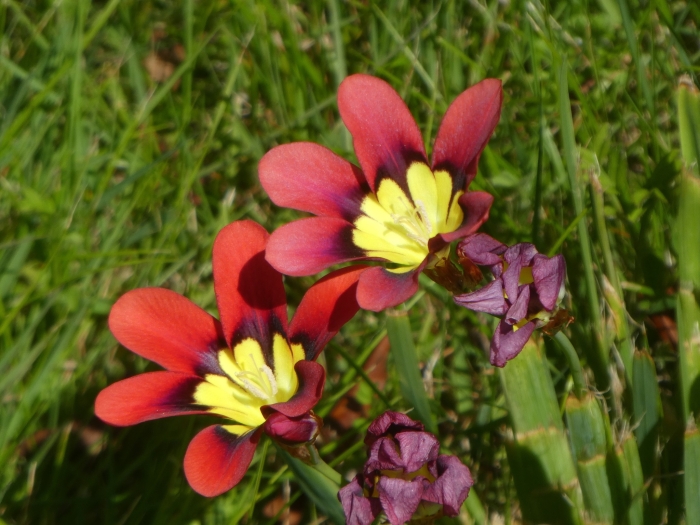Wandflower
(Sparaxis tricolor)
Wandflower (Sparaxis tricolor)
/
/

Doug Miller
CC BY 4.0
Image By:
Doug Miller
Recorded By:
Copyright:
CC BY 4.0
Copyright Notice:
Photo by: Doug Miller | License Type: CC BY 4.0 | License URL: http://creativecommons.org/licenses/by/4.0/ | Rights Holder: Doug Miller | Publisher: iNaturalist | Date Created: 2019-09-26T14:12:53-07:00 |
















































Estimated Native Range
Summary
Sparaxis tricolor, commonly known as Wandflower, Harlequin Flower, or simply Sparaxis, is a deciduous perennial herb native to the fynbos and renosterveld vegetation types within the Cape Floristic Region in South Africa. This bulbous plant typically grows to a height of 1-2 feet and a width of 0.4 feet. It is celebrated for its striking, star-shaped flowers that bloom in spring, showcasing a vibrant array of colors including black, yellow, orange, purple, and red, often with a golden center and a small ring of brown surrounded by contrasting hues. The flowers are particularly showy, making them a favorite among gardeners for adding a splash of color to borders and beds.
Sparaxis tricolor thrives in cultivation due to its low water requirements and preference for well-drained soils, making it suitable for xeriscaping and Mediterranean gardens. It is often used in rock gardens, as a bedding plant, and for cut flowers due to the long vase life of its blooms. While it prefers full sun, it can tolerate light shade. Gardeners should be aware that although it is not typically prone to serious diseases or pests, it may be susceptible to bulb rot if overwatered or planted in poorly drained soils. To prevent this, ensure proper drainage and avoid excessive watering. Sparaxis tricolor is not known for being invasive outside its native range, but as with all non-native plants, gardeners should monitor its growth and spread.CC BY-SA 4.0
Sparaxis tricolor thrives in cultivation due to its low water requirements and preference for well-drained soils, making it suitable for xeriscaping and Mediterranean gardens. It is often used in rock gardens, as a bedding plant, and for cut flowers due to the long vase life of its blooms. While it prefers full sun, it can tolerate light shade. Gardeners should be aware that although it is not typically prone to serious diseases or pests, it may be susceptible to bulb rot if overwatered or planted in poorly drained soils. To prevent this, ensure proper drainage and avoid excessive watering. Sparaxis tricolor is not known for being invasive outside its native range, but as with all non-native plants, gardeners should monitor its growth and spread.CC BY-SA 4.0
Plant Description
- Plant Type: Herb
- Height: 1-1.5 feet
- Width: 0.267-0.4 feet
- Growth Rate: Moderate
- Flower Color: Yellow, Orange, Purple, Red, White
- Flowering Season: Spring
- Leaf Retention: Deciduous
Growth Requirements
- Sun: Full Sun
- Water: Low
- Drainage: Fast
Common Uses
Bee Garden, Drought Tolerant, Groundcover, Low Maintenance, Potted Plant, Rock Garden, Showy Flowers
Natural Habitat
Fynbos and renosterveld vegetation types within the Cape Floristic Region
Other Names
Common Names: Three-Color Harlequin-Flower, Sparaxis, Harlequin-Flower, Dreifarbiges Fransenschwertel
Scientific Names: , Sparaxis tricolor, Sparaxis lineata, Ixia tricolor, Sparaxis blanda, Sparaxis grandiflora var. lineata, Sparaxis griffinii, Sparaxis tricolor var. blanda, Sparaxis tricolor var. griffinii, Sparaxis tricolor var. versicolor
GBIF Accepted Name: Sparaxis tricolor (Schneev.) Ker Gawl.